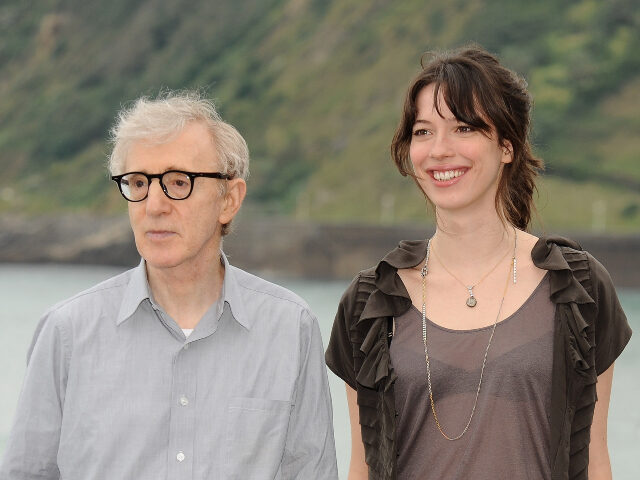Actress Rebecca Hall is one of the many Hollywood cowards who blacklisted Woody Allen. To her credit, she now says she “regrets” that and does not regret working with him.
From where I sit, it took about three, maybe four, minutes for the #MeToo movement to go full-fascist. What was sold as a long overdue cleansing of left-wing Hollywood’s barbaric treatment of vulnerable women quickly turned into an easy way for mercenary women to earn victim-cred or prove they were part of the mob by joining the electronic lynching of those who had yet to be proven guilty of anything.
Obvious monsters, like longtime Democrat insider Harvey Weinstein, were proven guilty, and his victims deserve all of our support and compassion. But let’s remember that Harvey thrived for decades and his predations were an open secret. It was only after he stopped making hit movies that his enablers turned on him.
Let’s also remember that the #MeToo movement has done nothing to demand the release of Jeffrey Epstein’s client list or that the disgraced #MeToo offshoot organization, Time’s Up, which was swimming in cash to protect women from sexual predators, was forced to close after it was caught enriching itself, shielding Democrats (Andrew Cuomo, Joe Biden) credibly accused of sexual misconduct, and covering up their own internal harassment allegations.
Nothing, though, disgusted me more than the morally obscene destruction of Woody Allen’s career and reputation.
Woody Allen is an innocent man, so innocent he was proven innocent after two separate states looked into the allegation he molested his daughter. Allen is so innocent, his case never even went to a grand jury. I’ve already laid his case out in detail more than once.
Using the 1950s blacklisting era as a how-to guide instead of a cautionary tale, people in the entertainment industry were pressured to denounce Allen or be seen as a rape enabler. The cowards were legion. Among others, there were Natalie Portman, Timothee Chamalet, Spike Lee, David Krumholz, Reese Witherspoon, Ellen Page, Mira Sorvino, Kate Winslet, Greta Gerwig, Colin Firth, and Rebecca Hall.
Hall starred in two films written and directed by the multiple Oscar winner: Vicky Cristina Barcelona (2008) and A Rainy Day in New York (2019).
Then, in the midst of the hysteria, Hall claimed to be so disgusted with herself for working with Woody Allen, she publicly denounced him and donated her salary from A Rainy Day in New York to Time’s Up (who likely used the money to intimidate some poor women who’d been abused by a Democrat).
Here’s what Hall said then:
Hall made a statement saying she saw “that my actions have made another woman feel silenced and dismissed” and was “profoundly sorry. I regret this decision and wouldn’t make the same one today.” She also pledged her salary from her recent project with Allen to the Time’s Up Legal Defense Fund.
Today, to her great credit, she says she regrets that. “I struggle with this one,” she told the Guardian. “It’s very unlike me to make a public statement about anything. I make the stuff, that’s how I am political. I don’t think of myself as an ‘actor-vist’, I’m not that person.”
She added, “And, I kind of regret making that statement because I don’t think it’s the responsibility of his actors to speak to that situation.”
“I don’t regret working with him,” Hall admitted. “He gave me a great job opportunity and he was kind to me.”
“I don’t talk to him anymore, but I don’t think that we should be the ones who are doing judge and jury on this.”
If asked about Allen today, Hall said, “I wouldn’t say anything – my policy actually is to be an artist. Don’t come out and state your stuff so much. I don’t think that makes me apathetic or not engaged. I just think it’s my job.”
This is a sea change in our culture. Last year, no way would Hall have felt comfortable admitting to something like this. It would have been the end of her career. Where we’re at is where I predicted years ago we would eventually land: the hangover phase of the #MeToo blacklisting binge. Once the mob hysteria dies, people are left to soul-search, and decent people not only realize they were wrong, but admit to it.
I know exactly how she feels. Twenty years ago, in my own small way, I did the same in defense of the Iraq War. I’m still ashamed of my behavior. It’s embarrassing to even think about. But shame and embarrassment are vital emotions to acknowledge if you want to try to strive to be a better person. With one sentence, you can lift the heaviness from your heart: “I’m sorry, I was wrong.”
John Nolte’s first and last novel, Borrowed Time, is winning five-star raves from everyday readers. You can read an excerpt here and an in-depth review here. Also available in hardcover and on Kindle and Audiobook.

COMMENTS
Please let us know if you're having issues with commenting.